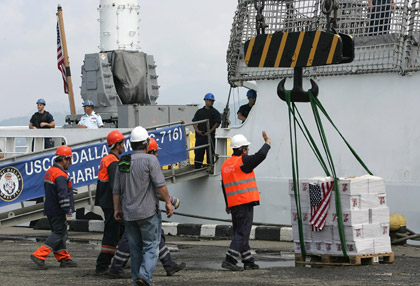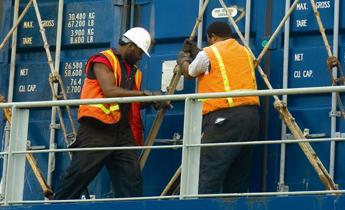A social dialogue committee in the port sector was launched by the European Commission and involves port authorities, terminal operators, dockers and other port workers across the EU.
The Commission further intends to start a research project soon that will examine health and safety, training and qualification challenges in EU ports. Social partners will be involved in this project, while the research team wil include pariticipation of members of the PortEconomics team. An overall review of the social dialogue is planned for 2016, to assess progress made.
The new social dialogue committee holded its inaugural meeting in Brussels on June 19, brining together the European Sea Ports Organisation, the European Federation of Private Port Terminal Operators, the European Transport Federation and the International Dockers Coordination Europe, representing dockers and port workers in European ports.
The committee will examine the challenges faced by the sector and help contribute to its long term success. Ports are not only engines of economic development and sources of prosperity, more cargo, cruise ships and ferries in our ports means also more jobs and new opportunities.
Background
1.5 million workers are employed in European ports, with the same amount again employed indirectly across the 22 EU maritime Member States.
The committee’s work programme for the next years reflects the commitment of the social partners to address these challenges jointly, covering topics such as: training and qualifications; attractiveness to young workers; health and safety; and promotion of female employment.
On 23 May 2013, the Commission presented to the European Parliament and to the Council a legislative proposal for modernising port services and attracting port investments in the EU. In this difficult economic period, ports and maritime logistics are continuing their recovery, facilitating trade for EU export and contributing to the competitiveness of European industries.
In the next 15-20 years, European ports will face a challenging growth in traffic, and need to adapt to new generations of ships coming into service, new energy trades in gas and biomass and new logistic complexities regarding terminal operations and connections of ports with the hinterland.
This prospected growth will create many new jobs, in particular for young workers. However, the technology developments are changing training requirements. An increased demand for technical training will go hand in hand with a stronger focus on IT technologies applicable to cargo-handling and logistics inside the port. At the same time, these new requirements could affect working conditions and give rise to new risks and hazards for workers.
As part of an action plan accompanying its legislative proposal, the Commission agreed to provide technical and administrative support to the social dialogue in order to address these common challenges.
European social dialogue refers to discussions, consultations, negotiations and joint actions involving organisations representing the two sides of industry (employers and workers). It is part of the European social model and is recognised as a tool of good governance and of social subsidiarity. It has also demonstrated its role as an instrument of social resilience, helping to mitigate the negative social impact of a recession and crisis.
But this doesn’t imply a ‘wait and see’ policy

The decission to set a social dialogue committee does not however imply a “wait and see policy”. The very next day, June 20th, the European Commission refered Spain to Court over rules for hiring port labour in several Spanish ports.
Currently, cargo-handling companies in these ports are not allowed to resort to the market to employ their staff. On the contrary, the rules in place oblige cargo-handling companies to participate financially in the capital of private companies, which in turn provide them with the required workforce. It is only when the workforce proposed by these private companies is not suitable or not sufficient that cargo-handling companies may freely hire staff from the market. The Commission considers that cargo-handling providers from other Member States wishing to establish themselves in Spanish ports may be discouraged from doing so because of these restrictive labour practices. Treaty rules on freedom of establishment fully apply to port activities. In particular, the Treaty precludes any national measure which, even though not discriminatory on grounds of nationality, hinders or renders less attractive the exercise of the freedom of establishment.
Spanish law provides that private companies called SAGEPs (Sociedad Anónima de Gestión de Estibadores Portuarios) should be set up in ports of general interest. SAGEPs are in charge of recruiting dockers and putting them at the disposal of cargo-handlers. These rules are applicable to the largest Spanish ports, including the ports of Barcelona, Algeciras, Valencia and Bilbao. The same law obliges all companies wishing to provide cargo-handling services to join and financially participate in the capital of a SAGEP.
Cargo-handling companies can be exempted from this obligation only in very marginal cases. Moreover, the cargo-handling company has to rely on workers recruited and put at its disposal by the SAGEP. Only if the dockers proposed by the SAGEP are not sufficient or not suitable, may the cargo-handling companies freely recruit workers from the market, but even then only for one working shift. This causes a forced alteration of the companies’ existing employment structures, recruitment policies and ultimately business strategies. Such changes may entail serious disruption within companies and have significant financial consequences. Cargo-handling companies may consequently be discouraged from establishing themselves in Spanish ports of general interest.












